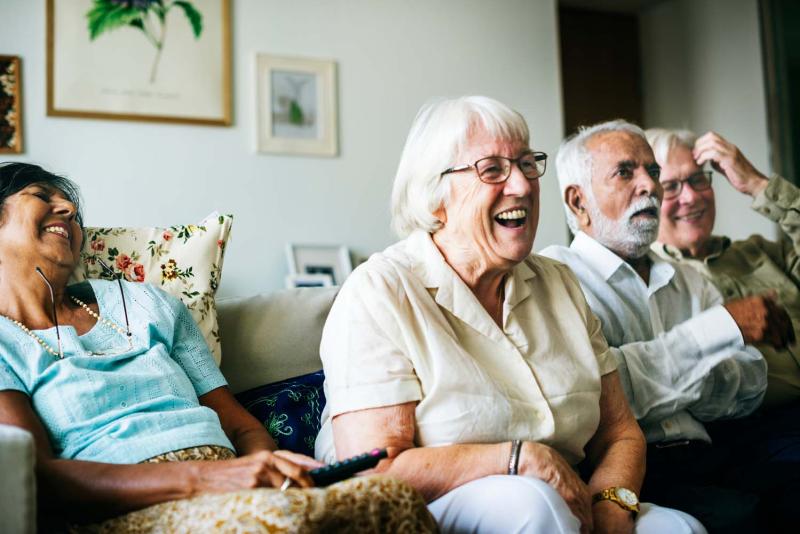Key points
- Support groups refer to a group of people with common problems or similar situations, who meet regularly to exchange personal experiences and feelings, and provide support for each other.
- Support group sessions are facilitated by a trained professional or a layperson who can relate to the experiences of the attendees.
- There are different types of support group interventions such as online, face-to-face, group, or formal and informal sessions; however, there is no recommended standard approach.
- Overall, support group interventions increase social support and decrease loneliness among older people in aged care settings, particularly in residential care settings.
Support groups refer to a gathering of people with similar issues in relation to a topic of relevance. Groups usually gather on a regular basis to share and exchange information and experiences and provide mutual support for one another. [1, 2] Support groups and support group interventions have been used in aged care to prevent and address social isolation. [3]
Support group interventions are usually based on the needs of a specific group. Groups vary in frequency, level of formality and mode of delivery. More formal support groups are frequently structured and facilitated by a professionally trained leader, whilst informal ones are often less structured, and usually facilitated by a layperson. The effectiveness and outcomes of these support groups usually vary and are based on the level of peer support for their members. As there is no standard approach to structuring and conducting support groups, there is a consistent acknowledgement that outcomes may be different for each group and setting.
This evidence theme on support group interventions is a summary of one of the key topics identified by a scoping review of social isolation research. If you need more information on this topic, try using the PubMed search below.
We found two reviews that report on support group interventions. Overall, support groups increase social support and decrease feelings of isolation and loneliness among older people in residential care settings. More specifically:
- Weekly support group meetings led by trained staff using facilitation guides were found to build relationships and meaningful connections. The meetings involved discussions on topics chosen by the participants with related music, readings, and photos. The meetings provided opportunities for people to release their emotions and help each other, in doing so, decreasing feelings of loneliness. [4,5]
- Weekly three-hour support group meetings, equivalent to 35-38 sessions in a year, addressed the problems of older people relating to social isolation, loneliness, depressive symptoms and daily functional activities. They were also shown to increase social support. [6,7]
- Identify older people who may be socially isolated or at risk of social isolation. Try to get them engaged early with an appropriate group and identify additional support structures that may be available to the person.
- Individuals with experience or an interest in this area might consider undertaking professional development or mentoring someone else in how to start and conduct a support group within an aged care or community setting.
- Set up support groups in a residential aged care facility or the community for people at risk of poor outcomes through social isolation.
- Identify a facilitator or provide specific training to set up and facilitate the support group sessions. This might be a lay person or a health professional, depending on the group’s objectives, structure and the needs of the members.
- Consider engaging subject matter experts as the need arises.
- Prioritise topics of interest and need among the participants while remaining vigilant to changing needs throughout the duration of the program.
- Better Health Channel. Support groups [Internet]. 2021 [cited 2023 Jun 30]. Available from: https://www.betterhealth.vic.gov.au/health/servicesandsupport/finding-a-support-group.
- Brunelli AA, Murphy GC, Athanasou JA. Effectiveness of social support group interventions for psychosocial outcomes: A meta-analytic review. The Australian Journal of Rehabilitation Counselling. 2016;22(2):104-27.
- Social support groups: Ageing with new friends. Aged Care Online [Internet]. 23 Sept 2018. [cited 2023 Jun 30]. Available from: https://agedcareonline.com.au/2018/09/Social-Support-Groups-Ageing-with-new-friends
- Mikkelsen ASB, Petersen S, Dragsted AC, Kristiansen M. Social interventions targeting social relations among older people at nursing homes: A qualitative synthesized systematic review. Inquiry. 2019;56:46958018823929.
- Theurer K, Wister A, Sixsmith A, Chaudhury H, Lovegreen L. The development and evaluation of mutual support groups in long-term care homes. J Appl Gerontol. 2014;33(4):387-415.
- Tong F, Yu C, Wang L, Chi I, Fu F. Systematic Review of efficacy of interventions for social isolation of older adults. Front Psychol. 2021;12:554145.
- Bøen H, Dalgard OS, Johansen R, Nord E. A randomized controlled trial of a senior centre group programme for increasing social support and preventing depression in elderly people living at home in Norway. BMC Geriatr. 2012;12:20.
Connect to PubMed evidence
This PubMed topic search is limited to home care and residential aged care settings. You can choose to view all citations or citations to articles available free of charge.


